 |
| AP Board Class 6 Social Science Chapter 9 Government Textbook Solutions PDF: Download Andhra Pradesh Board STD 6th Social Science Chapter 9 Government Book Answers |
Andhra Pradesh Board Class 6th Social Science Chapter 9 Government Textbooks Solutions PDF
Andhra Pradesh State Board STD 6th Social Science Chapter 9 Government Books Solutions with Answers are prepared and published by the Andhra Pradesh Board Publishers. It is an autonomous organization to advise and assist qualitative improvements in school education. If you are in search of AP Board Class 6th Social Science Chapter 9 Government Books Answers Solutions, then you are in the right place. Here is a complete hub of Andhra Pradesh State Board Class 6th Social Science Chapter 9 Government solutions that are available here for free PDF downloads to help students for their adequate preparation. You can find all the subjects of Andhra Pradesh Board STD 6th Social Science Chapter 9 Government Textbooks. These Andhra Pradesh State Board Class 6th Social Science Chapter 9 Government Textbooks Solutions English PDF will be helpful for effective education, and a maximum number of questions in exams are chosen from Andhra Pradesh Board.Andhra Pradesh State Board Class 6th Social Science Chapter 9 Government Books Solutions
| Board | AP Board |
| Materials | Textbook Solutions/Guide |
| Format | DOC/PDF |
| Class | 6th |
| Subject | Social Science |
| Chapters | Social Science Chapter 9 Government |
| Provider | Hsslive |
How to download Andhra Pradesh Board Class 6th Social Science Chapter 9 Government Textbook Solutions Answers PDF Online?
- Visit our website - Hsslive
- Click on the Andhra Pradesh Board Class 6th Social Science Chapter 9 Government Answers.
- Look for your Andhra Pradesh Board STD 6th Social Science Chapter 9 Government Textbooks PDF.
- Now download or read the Andhra Pradesh Board Class 6th Social Science Chapter 9 Government Textbook Solutions for PDF Free.
AP Board Class 6th Social Science Chapter 9 Government Textbooks Solutions with Answer PDF Download
Find below the list of all AP Board Class 6th Social Science Chapter 9 Government Textbook Solutions for PDF’s for you to download and prepare for the upcoming exams:Question 1.
Write the differences between Parliamentary and Presidential democracy.
Answer:
In the Parliamentary system, the executive body is formed from the legislature. The executive body is responsible to the legislature. (Ex: India & Britain).
In the Presidential system, the executive body is not formed from the legislature. The executive body is not responsible to the legislature. (Ex: America & Brazil)
Question 2.
What is a government? What are the different types of governments?
Answer:
A Group of people that controls and makes decisions for a country or a state is called the government. Monarchy and democracy are the different types of government.
Question 3.
Write any four activities organized by the government in our times.
Answer:
- The government ensures food, shelter for the citizens.
- Government helps the people during cyclones and floods.
- Government has the duty of protecting the boundaries.
- Government builds schools, hospitals, and roads.
- Government implements various schemes for the welfare of the people.
Question 4.
Is it possible to include the opinions of all the participants in taking a decision? Discuss with some more examples.
Answer:
No. It is not possible to include the opinions of all the participants in taking a decision. Only one decision can be implemented in a concept. If there are 20 members in a meeting and one proposal is supported by 11 members and 9 members oppose it. Even 9 members opposed the proposal, it will be implemented because the majority of the members supported the proposal. But some amendments can be done to the proposal.
Question 5.
How would your school function if it was run by all the students and teachers together? Would you want everyone to participate in taking decisions? or would you like to elect representatives? Give reasons?
Answer:
If a school is run by all the students and teachers so many good decisions can be taken for the prosperity of the school. Teachers can express the problems faced by the students and students can also express their problems.
This will lead to a friendly atmosphere in the school. Because a school is a small unit both ways can be implemented. Teachers’ and students’ interactions will help the students in the future also. They can express their views freely in the future also. Nowadays in so many job interviews and group discussions are followed. There are opinions are to be expressed. If we follow this method from the school level it will be beneficial for the students.
Question 6.
Do you think the decision-making in your school is democratic? Does everyone has a say in it?
Answer:
The decision-making in our school is democratic. We discuss the issues with our class leader and they can be discussed with our class teacher later and a solution can be found.
Question 7.
Satwik’s father consulted all the members of his family on setting up a shop but everyone had a different opinion. Finally, he decided to set up the shop. Do you think he was democratic?
Answer:
In my opinion, Satwik’s father was democratic. Because
- he consulted all the members and asked their opinion in setting the shop.
- I think the majority of the family members supported the idea of setting up a shop.
So, Satwik’s father might have decided to set up the shop.
Question 8.
Padma’s mother asked all children where they would like to go on Sunday. Two children wanted to go and watch a film and three wanted to go to the park. If you were in Padma’s place what decision would you take? Give reasons.
Answer:
If I am Padma’s mother I will take them to the park on that Sunday because three of them are interested to go to the park.
I will convince them that I will take them to the cinema another Sunday.
Question 9.
The place of origin of democracy is …………….
a) China
b) India,
c) Greece
d) Rome
Answer:
c) Greece
Question 10.
Who has the right to make decisions in direct democracy?
a) Men
b) Women
c) Representative
d) All eligible voters
Answer:
d) All eligible voters
Question 11.
In India, all the people above …………….. years of age enjoy Universal Adult Franchise.
a) 18 years
b) 21 years
c) 20 years
d) 19 years
Answer:
a) 18 years
Question 12.
Every state and union territory in India has a Capital city. This is the headquarters of the state government. Point put the following state capitals which are the headquarters of the state governments concerned in the next page given India Map.
1. Maharashtra
2. Tamilnadu
3. Andhra Pradesh
4. Karnataka
5. West Bengal
6. Telangana
7. Ladakh
8. Punjab
9. Kerala
10. Arunachal Pradesh
11. Madhya Pradesh
12. Jharkhand
13. Chattisgarh
14. Uttarakhand
15. Gujarat
16. Odisha
Answer: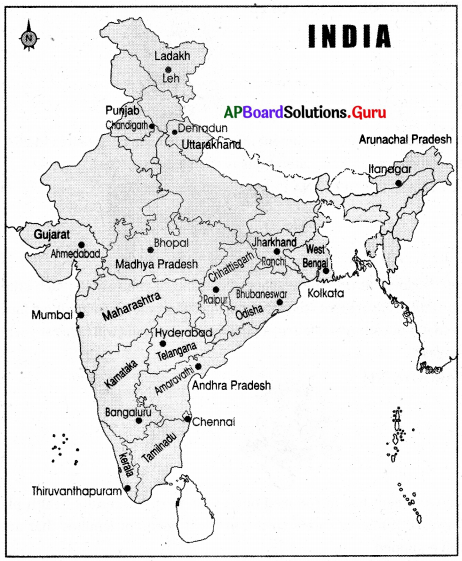
Project Work
1. Collect some logos and information about different welfare schemes of our government.
Answer:
- AMMA VODI:
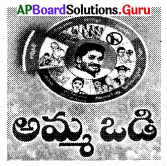
The Hon’ble Chief Minister, Government of Andhra Pradesh has announced a flagship programme “AMMA VODI” as a part of “NAVARATNALU” for providing financial assistance to each mother or recognized guardian in the absence of the mother, who is below the poverty line household, irrespective of caste, creed, religion, and region. - HOUSING SCHEME FOR POOR PEOPLE:
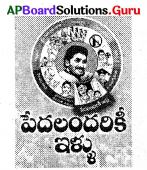
Under the program, the government intends to provide house-sites to 26.6 lakh people below the poverty line. Later, houses will be constructed. - JAGANNANA VASATHI DEEVANA:

The scheme is aimed at providing financial assistance to nearly 14 lakh students across the state and to ensure that students from lower-income households get financial assistance for their education “while Jagannana Vasathi Deevana will take care of hostel and mess charges.” - Dr. YSR AAROGYASRI:

The state government has introduced one of the most successful health plans – Dr. YSR Aarogyasri. It mainly caters to the medical needs of families that are not financially well equipped. - JALA YAGNAM:

This project accords the highest priority for the development of irrigation infrastructure, particularly in backward and drought-prone areas by taking up this program in a big way. Jala Yagnam includes a number of irrigation projects by the construction of reservoirs and lifts irrigation systems for lifting water from major rivers, particularly from the Godavari, to provide immediate irrigation benefits.
2. Collect the pictures of the President of India, Prime Minister, Governor and Chief Minister, your local M.P (Lok Sabha), and M.L.A from newspapers and prepare a scrapbook.
Answer:
Student Activity.
6th Class Social Studies 9th Lesson Government InText Questions and Answers
Let’s Do
Question 1.
Look at the newspaper headlines below and list the different activities of the government. (Textbook Page No. 101)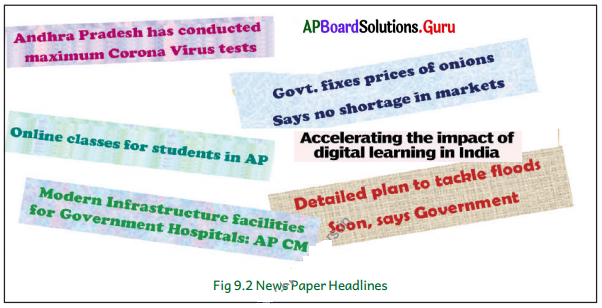
Answer:
- Educational facilities like online classes to students.
- Government has a plan to tackle floods soon.
- Government fixes the price of onions. Onions will be put into the market and see that there will be no shortage.
- AP government has conducted maximum Coronavirus tests.
- Modern facilities will be provided in the hospitals to serve the poor.
- Accelerating the impact of digital learning in India.
Question 2.
With the help of your teacher, try to know the above Logos and pictures of government schemes (Refer Text page 102 for the figure). Fill the following Mind map. (Textbook Page No. 102)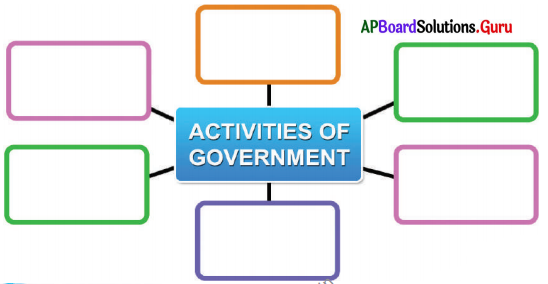
Answer: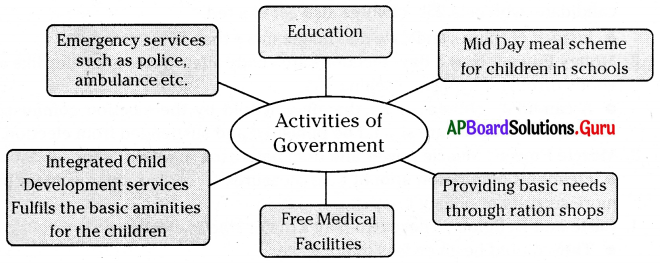
Question 3.
Observe the following pictures. Write the name of the government in respective boxes. (Textbook Page No. 103)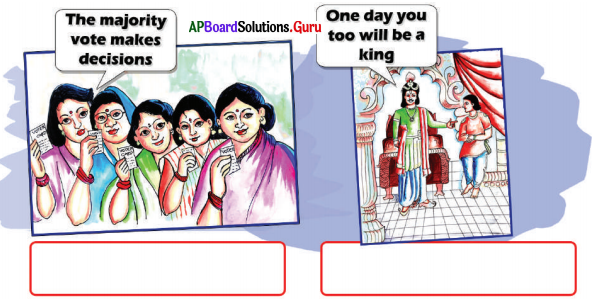
Answer: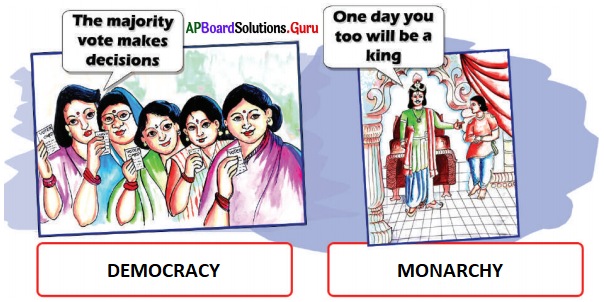
Question 4.
Conduct a model election with the help of your teacher. Observe the process of the election. (Textbook Page No. 105)
Answer:
Students: Good morning teacher.
Teacher: Good morning my dear children. Today let us conduct a model election in the class. You all select a student among you as your class leader.
Students: OK teacher.
Teacher: Two of you can contest for the class leader post. Take a piece of paper of the same size.
Students: OK teacher.
Teacher: OK. Now write the name of the student whom you want to be the class leader on the piece of paper you have taken. Fold the paper and put that paper in the box kept in the corner of the room.
Teacher: Now open the box and count who got more votes. According to the majority who get more votes will be declared as the class leader. Like this in a democracy elections will be held. A candidate who gets more votes will be declared elected.
Question 5.
Ask your parents and, find out the problems they observed in the electoral system and prepare a report. Discuss it in your class and find solutions for these problems. (Textbook Page No. 105)
Answer:
- Majority System: Present majority system leads to many problems. Sometimes a candidate who gets 25% of the votes also gets elected.
- Instead of this, a candidate should get more than 50% votes.
- Money Power: Nowadays elections are a costly affair. Votes are being as a market good through buying and selling.
- A candidate should spend the amount told by the election commission. If it increases the candidate should be punished and suspended from the election.
- Muscle Power: Muscle power and domination are another major setbacks.
- Election Commission should take measures to control this problem by giving more security at polling booths.
- Caste and Religion: These two play a major role in elections.
- They should be given less importance.
Think and Respond
(Textbook Page No. 100)
Question 1.
How is the legislature is different from the executive?
Answer:
The legislature: Legislature is the law and policy-making body either in the Parliament or State assembly.
The Executive: Executive is responsible for the effective implementation of the laws/ policies passed in the legislature.
Question 2.
What is the prime duty of the judiciary?
Answer:
Interpreting the laws is the prime duty of the judiciary.
(Textbook Page No. 102)
Question 3.
Name some more works of the government.
Answer:
- Amma Vodi
- YSR Asara
- Ban on Alcohol
- Jalayagnam
- Fee Reimbursement
- Arogyasri
- YSR Rythu Bharosa
Pedalandariki illu and Pensionla Pempu are some other welfare schemes of Andhra Pradesh.
Question 4.
What kind of facilities do you expect from the government?
Answer:
Important facilities we expect from the government are sanitation, public transport, health care, and water, etc.
(Textbook Page No. 103)
Question 5.
What kind of government do you like? Why?
Answer:
I like the democratic type of government. Because we can express our ideas freely without any hesitation and fear. If they are better, sometimes they can be followed also.
Question 6.
Which government respects the opinion of the people?
Answer:
The democratic type of government respects the opinion of the people.
(Textbook Page No. 104)
Question 7.
What are the differences between monarchy and democracy?
Answer:
| Monarchy | Democracy |
| 1) Ruling will be done by a king or queen. | 1) Ruling will be done by the representatives elected by the people. |
| 2) A monarch comes into power by inheritance. | 2) Power can’t be inherited. |
| 3) Powers will be with King only. | 3) People have rights. |
Question 8.
Is it possible to implement direct democracy in India? Give reasons.
Answer:
It is not possible to implement direct democracy in India. In India, it may be difficult because of the huge population and vast area.
Question 9.
How is direct democracy different from indirect democracy?
Answer:
In direct democracy people directly participate in decision-making. It is possible in small countries.
In an indirect democracy, people participate in decision-making indirectly through their representatives. It is best to follow indirect democracy in large countries like India.
(Textbook Page No. 105)
Question 10.
How do you understand the rule of majority? Give another example.
Answer:
If the majority of the representatives do not support it, a good proposal may also be objected to. The shop setting of Satwik’s father may not be profitable. But the majority of the family members agreed to set the shop. So Satwik’s father decided to set the shop following the idea of the majority of family members.
Question 11.
Why do we have a government at different levels?
Answer:
Different levels of the government make it easy to distribute power among them. Administration can be easily managed with different levels of the government.
Explore
Question 1.
With the help of your teacher, try to know if any monarchies are there in the world at present? (Textbook Page No. 102)
Answer:
There are monarchies in some countries in the world at present. Some of them are:
- The kingdom of Saudi Arabia
- The United Arab Emirates
- The Sultanate of Oman.
Question 2.
Observe the world map given below and list out the countries that are following the parliamentary system and the presidential system separately. (With the help of your teacher). Refer to the world map given at the end of the book. (Textbook Page No. 106)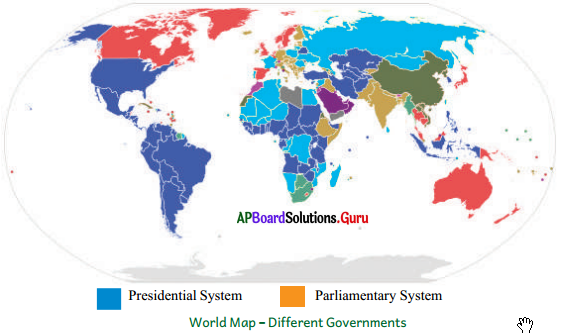
Answer:
Parliamentary System
- India (Asia)
- Montenegro (Europe)
- Pakistan (Asia)
Presidential System
- Nigeria (Africa)
- Philippines (Asia)
- Paraguay (South America)
Parliamentary System
- Singapore (Asia)
- Somalia (Africa)
- Slovenia (Europe)
- Serbia (Europe)
- Slovakia (Europe)
- Turkey (Asia & Europe)
- Trinidad and Tobago (South America)
Presidential System
- Peru (South America)
- USA (North America)
- Uruguay (South America)
- Uzbekistan (Asia)
- Uganda (Africa)
- Ukraine (Europe)
- Tanzania (Africa)
Question 3.
With the help of your teacher try to know who is part of the central government and state government. (Textbook Page No. 107)
Answer:
- Central Government: President, Vice-President, Prime Minister, Council of Central ministers and Members of Parliament,
- State Government: Governor, Chief Minister, Council of State ministers, and members of Legislative Assemblies.
AP Board Textbook Solutions PDF for Class 6th Social Science
- AP Board Class 6
- AP Board Class 6 Social Science
- AP Board Class 6 Social Science Chapter 1 Our Earth in the Solar System
- AP Board Class 6 Social Science Chapter 2 Globe Model of the Earth
- AP Board Class 6 Social Science Chapter 3 Maps
- AP Board Class 6 Social Science Chapter 4 Land Forms Andhra Pradesh
- AP Board Class 6 Social Science Chapter 5 Early Life to Settled Life
- AP Board Class 6 Social Science Chapter 6 Early Civilisations
- AP Board Class 6 Social Science Chapter 7 Emergence of Kingdoms and Republics
- AP Board Class 6 Social Science Chapter 8 Kingdoms and Empires
- AP Board Class 6 Social Science Chapter 9 Government
- AP Board Class 6 Social Science Chapter 10 Local Self Government
- AP Board Class 6 Social Science Chapter 11 Indian Culture Languages and Religions
- AP Board Class 6 Social Science Chapter 12 Towards Equality
- AP Board Class 6 Social Science Chapter 1 సౌర కుటుంబంలో మన భూమి
- AP Board Class 6 Social Science Chapter 2 గ్లోబు – భూమికి నమూనా
- AP Board Class 6 Social Science Chapter 3 పటములు
- AP Board Class 6 Social Science Chapter 4 ఆంధ్రప్రదేశ్ – భూస్వరూపాలు
- AP Board Class 6 Social Science Chapter 5 సంచార జీవనం నుండి స్థిర జీవనం
- AP Board Class 6 Social Science Chapter 6 తొలి నాగరికతలు
- AP Board Class 6 Social Science Chapter 7 సామ్రాజ్యాలు, గణతంత్రాల ఆవిర్భావం
- AP Board Class 6 Social Science Chapter 8 రాజ్యాలు మరియు సామ్రాజ్యాలు
- AP Board Class 6 Social Science Chapter 9 ప్రభుత్వం
- AP Board Class 6 Social Science Chapter 10 స్థానిక స్వపరిపాలన
- AP Board Class 6 Social Science Chapter 11 భారతీయ సంస్కృతి, భాషలు మరియు మతాలు
- AP Board Class 6 Social Science Chapter 12 సమానత్వం వైపు







0 Comments:
Post a Comment